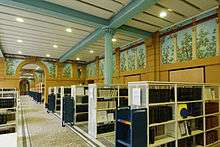Antoine Stinco
| Antoine Stinco | |
|---|---|
| Born |
1934 Tunis |
| Nationality | Italian, French |
| Occupation | Architect |
| Website |
www |


Antoine Stinco (born 1934) is a French architect who specializes in construction and renovation of museums and exhibition rooms.
Early years
Stinco was born in Tunis, Tunisia, and studied at the École nationale supérieure des Beaux-Arts in Paris in the studio of Edouard Albert, Paul Herbé and Jean Prouvé.[1] In 1967 Stinco and fellow-architects Jean Aubert and Jean-Paul Jungmann formed the group "Utopie" along with sociologists Hubert Tonka, Jean Baudrillard and others. Their goal was to create buildings that would be buoyant, mobile and ephemeral, in contrast the intert and repressed post-war architecture of the time. The architects organized an exhibition in March 1968 at the Musee d'Art Moderne de la Ville de Paris called "Structures Gonflables".[2] Stinco contributed the design for an inflatable mobile exhibition hall in which everyday things would be exhibited, drawing on the work of German structural engineer Frei Otto for the bubble-based form and on the philosophy of the Marxist Henri Lefebvre for the commonplace exhibits.[3]
Later work and philosophy
Stinco later moved into a more conventional office-based architectural practice.[3] From 1974 to 1976 he participated with GAU (Urban Architecture Group) in a project to renew urban architecture in France. In 1984 he opened his own architectural firm. Between 1993 and 1999 he taught in the sculpture department at the Beaux-Art in Paris.[1]
He was given the job of renovating the 1968 Maison de la Culture in Grenoble and adding a new wing, with the work completed in 2004. He said that he saw the challenge as "unlocking a building suspended above a green space, without resisting its architecture. I did not want to arrive at a vocabulary that opposed this building which symbolizes Grenoble's 'heroic period'...".[4] Talking of his construction of new buildings at the Musée des Beaux-Arts d'Angers, he said "I set myself a rule: release me from flat and literal compliance with the architecture of the past, and also from the ridiculous fear of not being 'modern'".[5]
Sample projects
With his company he specializes in construction and renovation of museums and exhibition rooms. Examples of his work
- Renovations of the Galerie nationale du Jeu de Paume, Tuileries Gardens in Paris (1987-1991)[6]
- Six kiosks in Tuilerie garden in Paris (1993–1996)[1]
- Renovation and extension of the Maison de la Culture de Grenoble, 2004[7]
- Renovation of the old Collège Sainte-Barbe, which became the Bibliothèque Sainte-Barbe in 2009
- Théâtre National de Bretagne in 2008
- Gallery of modern and contemporary art, Toulouse
- New buildings at the Musée des Beaux-Arts d'Angers[5]
- Development of new premises for the Musée du Pays Châtillonnais in Châtillon-sur-Seine in 2009[8]
References
- 1 2 3 "Antoine Stinco". au. The Japan Architects Co., Ltd. August 2004. Retrieved 2012-05-17.
- ↑ Marc Dessauce (1999). The Inflatable Moment: Pneumatics and Protest in '68. Princeton Architectural Press. ISBN 1568981767.
- 1 2 Joan Ockman (June 1998). "pneumotopian visions". Metropolis Magazine. Retrieved 2012-05-17.
- ↑ "MAISON DE LA CULTURE". Mimoa. Retrieved 2012-05-17.
- 1 2 "Antoine Stinco : "Plus mon intervention se fait oublier, plus je suis satisfait"". CyberArchi. 2004-06-30. Retrieved 2012-05-17.
- ↑ "Antoine Stinco". Structurae. Retrieved 2012-05-17.
- ↑ "La rénovation-extension de l'ancienne maison de la Culture de Grenoble par l'architecte Antoine Stinco". 06/12/2004. Retrieved 2012-05-17. Check date values in:
|date=(help) - ↑ "Dossier de presse de présentation du nouveau musée" (PDF). Musée du Pays Châtillonnais. Retrieved 2012-05-17.